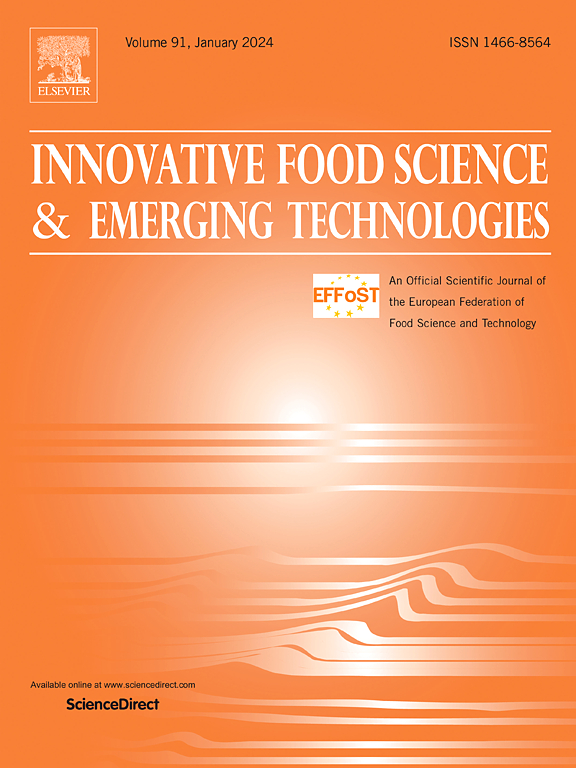Optimization of plasma-activated water-assisted extraction of basil seed (Ocimum basilicum L.) mucilage: Effect on phenols, flavonoids, antioxidant, thermal and morphological properties
IF 6.3
1区 农林科学
Q1 FOOD SCIENCE & TECHNOLOGY
Innovative Food Science & Emerging Technologies
Pub Date : 2024-11-30
DOI:10.1016/j.ifset.2024.103876
引用次数: 0
Abstract
This study aimed to enhance basil seed mucilage extraction using plasma-activated water (PAW). The response surface method (RSM) and rotating center composite design (RCCD) were used, considering the activation time of deionized water with cold plasma (0–15 min), water temperature (55–85 °C), and seed-water ratio (1:33–1:65). Optimal conditions for extraction were identified as a temperature of 78.39 °C, an activation time of 15 min, and a seed-water ratio of 1:50, leading to a 2.11 times higher extraction yield (7.6 %) compared to untreated samples (3.6 %) which had the same conditions. PAW-treated samples showed improved biological activities, including higher levels of total phenolic compounds (58.56 mg GAE/100 g), total flavonoids (87.81 mg QE/g), and DPPH inhibitory activity (60.98 %). Additionally, PAW treatment raised the melting point of basil seed mucilage, with minimal change in melting enthalpy. These alterations were attributed to plasma chemical reactions and increased surface energy of polysaccharide granules.
等离子活化水辅助提取罗勒籽浆液的工艺优化:对其酚类、类黄酮、抗氧化、热性能和形态性能的影响
本研究旨在提高等离子体活化水(PAW)对罗勒种子粘液的提取效率。采用响应面法(RSM)和旋转中心复合设计(RCCD),考虑冷等离子体活化去离子水的时间(0 ~ 15 min)、水温(55 ~ 85℃)和籽水比(1:33 ~ 1:65)。最佳提取条件为:温度78.39°C,活化时间15 min,料水比1:50,提取率(7.6%)是同等条件下未处理样品(3.6%)的2.11倍。paw处理后的样品具有较好的生物活性,其中总酚类化合物(58.56 mg GAE/100 g)、总黄酮(87.81 mg QE/g)和DPPH抑制活性(60.98%)均有所提高。此外,PAW处理提高了罗勒种子粘液的熔点,但熔点焓变化很小。这些变化归因于血浆化学反应和多糖颗粒表面能的增加。
本文章由计算机程序翻译,如有差异,请以英文原文为准。
求助全文
约1分钟内获得全文
求助全文
来源期刊
CiteScore
12.00
自引率
6.10%
发文量
259
审稿时长
25 days
期刊介绍:
Innovative Food Science and Emerging Technologies (IFSET) aims to provide the highest quality original contributions and few, mainly upon invitation, reviews on and highly innovative developments in food science and emerging food process technologies. The significance of the results either for the science community or for industrial R&D groups must be specified. Papers submitted must be of highest scientific quality and only those advancing current scientific knowledge and understanding or with technical relevance will be considered.

 求助内容:
求助内容: 应助结果提醒方式:
应助结果提醒方式:


